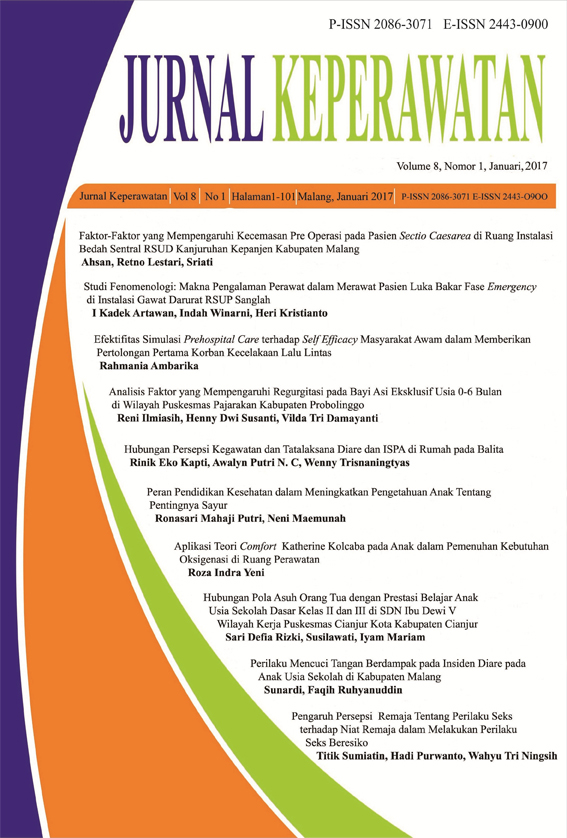Effectiveness of Simulated Prehospital Care Thought Self-Efficacy of Community in Giving First Aid on Traffic Accidents Victim
DOI:
https://doi.org/10.22219/jk.v8i1.4012Keywords:
Prehospital care, Self Efficacy, first aid on traffic accident victimAbstract
EFEKTIFITAS SIMULASI PREHOSPITAL CARE TERHADAP SELFEFFICACY
MASYARAKAT AWAM DALAM MEMBERIKAN
PERTOLONGAN PERTAMA KORBAN KECELAKAAN LALU LINTAS
Effectiveness of Simulated Prehospital Care Thought Self-Efficacy of
Community in Giving First Aid on Traffic Accidents Victim
Rahmania Ambarika1
1Program Studi Pendidikan Ners STIKes Surya Mitra Husada Kediri
Jalan Manila, No 37, Sumberece, Tosaren, Pesantren, Kota Kediri, Jawa Timur 64133
1e-mail: rahmania.ambar@gmail.com
ABSTRAK
Self-efficacy atau rasa percaya diri masyarakat awam dalam memberikan pertolongan pertama
korban kecelakaan tergolong rendah karena mereka takut tindakan mereka salah dan dapat
memperburuk kondisi korban kecelakaan.Hal ini disebabkan karena sebagian besar masyarakat
tidak mengetahui cara memberikan pertolongan yang benar. Pada periode pre hospital, jika di
tempat pertama kali kejadian penderita tidak mendapatkan bantuan yang optimal sesuai
kebutuhannya maka akan timbul masalah resiko kecacatan bahkan kematian. Penelitian ini
bertujuan untuk mengetahui pengaruh simulasi prehospital care terhadap self-efficacy masyarakat
awam dalam memberikan pertolongan pertama korban kecelakaan lalu lintas. Peneliti
menggunakan desain penelitian pre-eksperimen one-group pretest-postest design, didapatkan
jumlah sampel sebanyak 32 responden dengan menggunakan purposive sampling selanjutnya di
lakukan uji menggunakan Wilcoxon. Hasil penelitian dari 32 responden didapat sebagian besar
responden self-efficacy sebelum diberikan simulasi kategori tinggi sebanyak 16 responden (50%)
dan sesudah diberikan simulasi kategori tinggi sebanyak 22 responden (68,8%). Hasil analisis
didapatkan nilai sig (p) = 0.001, maka dapat disimpulkan ada pengaruh simulasi prehospital care
terhadap self-efficacy.
Kata kunci: Prehospital care, self efficacy, pertolongan pertama korban kecelakaan lalulintas
ABSTRACT
Self efficacy in general public to provide first aid accident victims is low because they are afraid of
their wrong actions and can worsen the accident condition because most people do not know how
to provide the right help. Prehospital period, if at the first incidence of patients do not get optimal
assistance according to needs will arise a problem of risk of disability and even death. Ordinary
people are the first victims of accidents so often find a need for increased knowledge to provide
help in case of an accident. Through the provision of first aid simulation of traffic accident victims
can improve understanding so as to enhance self efficacy in the community to provide first aid
accident victims. This study aims to determine the effect of simulated Prehospital care to the
general public self efficacy in providing first aid victims of traffic accidents. This study used a preexperimental
research design one-group pretest-posttest design, obtained a total sample of 32
respondents using purposive sampling and research instrument in the form of quitioner and using
the Wilcoxon test. The results of 32 respondents obtained the majority of respondents self efficacy
before being given a simulation of high category as many as 16 respondents (50%) and after the
simulation of high category given by 22 respondents (68.8%). The results of the analysis we found
sig (p) = 0.001, it can be concluded there is the influence of simulated Prehospital care of the self
efficacy.
Keywords: Prehospital care, Self Efficacy, first aid on traffic accident victim
Downloads
Downloads
Published
Issue
Section
License
Authors who publish with this journal agree to the following terms:
- Authors retain copyright and grant the journal right of first publication with the work simultaneously licensed under a Creative Commons Attribution-ShareAlike 4.0 International License that allows others to share the work with an acknowledgment of the work's authorship and initial publication in this journal.
- Authors are able to enter into separate, additional contractual arrangements for the non-exclusive distribution of the journal's published version of the work (e.g., post it to an institutional repository or publish it in a book), with an acknowledgment of its initial publication in this journal.
- Authors are permitted and encouraged to post their work online (e.g., in institutional repositories or on their website) prior to and during the submission process, as it can lead to productive exchanges, as well as earlier and greater citation of published work (See The Effect of Open Access).

This journal is licensed under the a Creative Commons Attribution-ShareAlike 4.0 International License.














